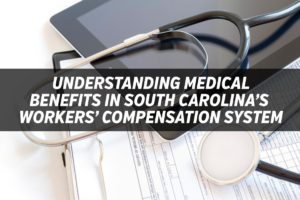Under South Carolina’s Workers’ Compensation Act, workers’ compensation is the exclusive remedy for injuries suffered in a work-related accident. Because workers’ compensation is the exclusive remedy, an injured employee may not sue an employer or co-employee for damages in court. Unlike in court, it is not possible to recover damages for pain and suffering or loss of enjoyment of life in the workers’ compensation system. These types of intangible damages – inextricably linked to difficult-to-measure subjective considerations – are excluded from the workers’ compensation system. This can lead to surprising results. For example, if you were rear-ended by a driver on the highway, you could sue that driver for damages, including pain and suffering and loss of enjoyment of life, in the civil justice system. However, if you were driving while conducting work-related business, and the rear-ending driver was a co-employee also conducting work-related business, you could not sue the co-employee driver, and instead could only recover tangible damages through the workers’ compensation system. Tangible damages include medical coverage.
This important workers’ compensation benefit includes the full and complete medical coverage for a work-injury. If the injuries suffered are severe, the workers’ compensation system might prove more financially beneficial for a full recovery because, unlike in the civil context, the extent of medical coverage is not capped in accordance with the nature and extent of insurance held by an at-fault party. So, even if medical costs for an injury sustained while on the job skyrocket into the millions, these costs will be covered through workers’ compensation.
This feature of South Carolina’s workers’ compensation act serves to protect those who have suffered catastrophic injuries such as a spinal cord injury resulting in paralysis while working. Additionally, there is no co-pay with regard to medical benefits received through the workers’ compensation system. This feature of law stands in contrast with the co-pay imposed by most health insurance plans. Under ordinary health insurance, one must assume a portion of the cost of medical treatment until a certain deductible payment floor is reached. Furthermore, under South Carolina’s workers’ compensation system, an injured employee is entitled to mileage reimbursement for costs incurred while traveling to and from medical treatment appointments, and trips to and from prescription drug dispensers. The same goes for the prescriptions themselves – they are also covered by workers’ compensation medical benefits.
Reach Out to a South Carolina Workers’ Compensation Attorney for Help
South Carolina’s workers’ compensation system provides many benefits to employees who have been injured while on the job. However, there are many complexities to the system. For example, an employer’s insurance carrier is allowed to choose the physician who will conduct the medical evaluation that is prerequisite to the insurer’s authorization of a request for treatment. To ensure that you navigate the system in way that results in the maximum dispensation of benefits, contact an experienced South Carolina workers’ compensation attorney.

David Price is a Personal Injury, Civil Litigation, Collections, and Criminal Defense Attorney who practices in Greenville, SC. He graduated from the University of Georgia School of Law, and has been practicing law for 12 years. David Price believes in helping those who have been injured. Learn more about his experience by clicking here.

